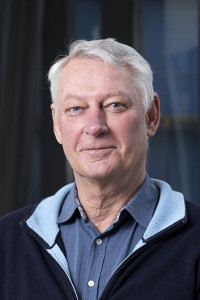Professor - Group leader

My primary interest is immune mediated disorders. In 2013 I implemented single cell mass cytometry which allows a detailed analysis of the immune system in health and disease. With this I was able to unravel the complexity of the human mucosal immune system and to provide the first evidence that tissue- and disease-associated immune subsets can be readily identified (van Unen et al. Immunity 2016). In addition, I analysed the human fetal mucosal immune system. This resulted in the identification of a novel ILC subset (Na et al, J. Exp. Med. 2018), which I also identified in close association with malignant epithelial cells in patients with colorectal cancer (de Vries et al, GUT, 2019). Moreover, the technology was used to provide evidence for CD4 T cell memory formation in the human fetal intestine (Na et al, Nature Immunol. 2019). In 2017 I introduced imaging mass cytometry in the institute and this has now been optimized for the analysis of both snap frozen and PFFE tissue samples (Na et al, 2019a; Ijsselstein et al, 2019b; Guo et al, 2020; Frontiers in Immunol.). My interest in tissue resident T cells started during my postdoc period when I played a critical role in the identification of the γδ T cell receptor on skin resident T cells (Koning et al, Science 1987; Koning et al J. Exp. Med. 1988). Upon return to the Netherlands the continuation of this research line led to both a co-authorship and a senior authorship in Nature (Holoshitz et al, Nature 1989; Rust et al, Nature 1990) and an interest into the role of γδ T cells in celiac disease (CeD) as their numbers are increased in the affected duodenum. In later work I studied the association between HLA-DQ2/8 molecules and CeD. As CeD is caused by dietary gluten proteins I implemented electrospray mass spectrometry and was the first to identify a gluten peptide that specifically bound to disease predisposing HLA-DQ molecules and stimulated pro-inflammatory CD4 T cells from patients (van der Wal et al. PNAS 1998). I also demonstrated that high affinity binding of such peptides to HLA-DQ requires modification by the enzyme tissue transglutaminase (van de Wal. J. Immunol, 1998, Vader et al. J. Exp. Med. 2002). This work formed the basis for subsequent studies that explained the disease inducing properties of wheat, barley and rye (Vader et al. Gastroenterology 2002; 2003; Spaenij-Dekking et al. Gastroenterology 2005), the HLA-DQ2 gene-dose effect (Vader et al, PNAS 2003) and that biased T cell receptor usage is a common feature in patients with CeD. A highly successful collaboration with Prof. J. Rossjohn resulted in the structure elucidation of 13 gluten-specific T cell receptors in complex with HLA-DQ-gluten (Broughton et al. Immunity 2012; Petersen et al. NSMB 2014; J. Immunol. 2015; Structure 2016) providing detailed insight into the requirements for high affinity recognition of gluten peptides and the biased T cell receptor usage. Most recently, this work has identified bacterially derived gluten-like peptides as potential initiators of CeD (Petersen et al, NSMB 2019). I also investigated the involvement of the innate immune system in refractory CeD where a monoclonal outgrowth of aberrant lymphocytes is observed (Schmitz et al Gut 2013; 2016). This work indicated that these aberrant ILC-like cells have distinct growth characteristics and are tofacitinib sensitive. A clinical trial based on this observation is ongoing. I have received several national and international prizes for my work. I have highly productive collaborations with clinicians and work closely together with data analysis experts.
I studied Biology at Leiden University, and graduated in 1981. I did my PhD training with Prof. van Rood at the Department of Immunohematology and Blood Transfusion (IHB) at the Leiden University Medical Center and defended my thesis in 1986. I did a postdoc in the group of Dr. J.E. Coligan at the National Institutes of Health, Bethesda, USA from 1986-1988.
2006-present Full Professor
Staff member and head of the Mucosal Immunology group. Member of the Daily Management Team, Dept. Immunology, Leiden University Medical Centre (LUMC), Leiden, the Netherlands
2013 Visiting Professor, University of Chicago, Chicago, USA
2012 Visiting Professor, University of Melbourne, Melbourne, Australia
2011 Visiting Professor, University of Oslo, Oslo, Norway
2004-2014 Director of the Dutch Celiac Disease Consortium
2000-2001 Visiting Professor, La Jolla Institute for Allergy & Immunology, La Jolla, US
1994-2006 Associate Prof. Head of section Immunochemistry, Dept IHB, LUMC, Leiden
1988-1994 Senior investigator, Dept IHB, LUMC, Leiden
Li N, van Unen V, Abdelaal T, Guo N, Kasatskaya SA, Ladell K, McLaren JE, Egorov ES, Izraelson M, Chuva de Sousa Lopes SM, Höllt T, Britanova OV, Eggermont J, de Miranda NFCC, Chudakov DM, Price DA, Lelieveldt BPF, and Koning F.
Nature Immunology, 2019; 20(3):301-312.
Li N, van Unen V, Höllt T, Thompson A, van Bergen J, Pezzotti N, Eisemann E, Vilanova A, Chuva de Sousa Lopes SM, Lelieveldt BPF, Koning F.
J. Exp. Med. 2018 May 7;215(5):1383-1396.
van Unen V, Li N, Molendijk I, Temurhan M, Höllt T, van der Meulen-de Jong AE, Verspaget HW, Mearin ML, Mulder CJ, van Bergen J, Lelieveldt BPF, Koning F.
Immunity 2016; 44(5): 1227-39.
Looking for information on one of our topics, a new place to conduct your research or connect to experienced researchers to join forces with? Feel free to contact us!